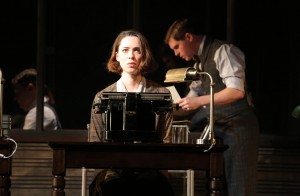In 1922, New York City was in a thrust of urbanization. Women manned the desks of the American workplace for the first time, and the click-clack of their typewriters beat the heart of an emergent labor force. This is the urban landscape of playwright Sophie Treadwell’s expressionistic play, Machinal, which Roundabout Theatre Company has brought back to Broadway's American Airlines Theatre for the first time since its 1928 debut. Based on events in the life of Ruth Snyder, Machinal follows the character of the Young Woman from her tedious stenographer job, to a loveless marriage with her boss, to the birth of an unwanted child, to an illicit love affair, and finally to the trial for her husband's murder.
First, an introduction to the play and its relation to expressionism. Just as a dollhouse mimics a human house, realistic theater mimics reality. Alternatively, expressionism distorts reality from a subjective viewpoint of experience. Though Treadwell may not have intended Machinal to play as straight expressionism, she was one of several American playwrights importing the genre in the 1920s, including Elmer Rice and Eugene O'Neill. Machinal includes significant trademarks of expressionism, such as monologues expressing heightened intensity and a soundscape that blends human speech with mechanical sounds such as the typewriter. Experienced from the Young Woman’s perspective, Machinal nightmarishly depicts her internal struggle to separate her own desires from societal demands in the realms of labor, marriage and childbirth.
Focusing on the acting in the Roundabout production, it seems as if director Lyndsey Turner has dialed the expressionism way down. While clearly a directorial choice, this may have been at the expense of the production’s effectiveness. Though there were moments when the actors’ vocal rhythms invoked the same industrial throbbing evoked by Matt Tierney’s innovative sound design, their rhythms mostly remained natural and human. While vibrant characterizations such as Suzanne Bertish’s memorable Mother and Ashley Bell’s sassy Telephone Girl demonstrate the actresses' fine chops, they confused the production’s overall style and mood. As the Young Woman, Rebecca Hall’s delivery read as exceptionally realistic. Under Turner’s direction, unfortunately, Hall's character arc is indeterminable; though we see her suffer at several crisis points — a panic attack in the subway, followed by breakdowns in her mother’s apartment, on her honeymoon, and in the hospital after childbirth — each of these instances plays at an equal magnitude, conveyed by a good deal of high-pitched angst. These moments are the play’s sorest loss; in favor of realism, Turner’s direction misses Treadwell’s moments of intensely alienating and telegraphic rhythm.
The one actor refreshingly committed to an expressionistic stylization was Michael Cumpsty, whose caricature of the Husband is delightfully automated. Certain moments of choreography favored expressionism, too, such as one vignette in the hospital in which nurses, doctors, patients and visitors robotically repeat mundane gestures; without the rest of the play supporting it, however, this brief moment fell short of evoking anything more than an interesting transition.
Expressionism heavily influenced many elements of the production's design. The magnificent rotating stage designed by Es Devlin revealed scene after striking scene; its visible machination an obvious yet powerful nod to the play’s title and its expressionistic roots. Lighting designer Jane Cox's innovative technique incorporated hard, bright horizontal lines of light that scanned the set, sometimes lingering on a face, an embrace or an expression. Overall, the design team provided the visual and aural landscape of industrialization that the ensemble largely lacked in stylization.
If you’re looking for a production that really honors the vein of expressionism coursing through Machinal, the stylistically noncommittal performances in Roundabout Theatre Company’s latest production may disappoint you. Though earnest and well-rehearsed, these deliveries clash with a production design meant to evoke a historical moment when New York City was developing vertically at breakneck speed. Machinal captures a human soul whose body is caught in the cogs of an emerging industrial landscape; while this production's design skillfully evokes the sights and sounds of this phenomenon, the performances fail to evoke a larger emotional experience.
Machinal runs until March 2 at the American Airlines Theatre (227 West 42nd St.). Evening performances are at 8 p.m. on Tuesday through Saturday; matinee performances are at 2 p.m. on Wednesday, Saturday and Sunday. Tickets range from $52-$127 and are available for purchase at 212-719-1300 or www.roundabouttheatre.org.



